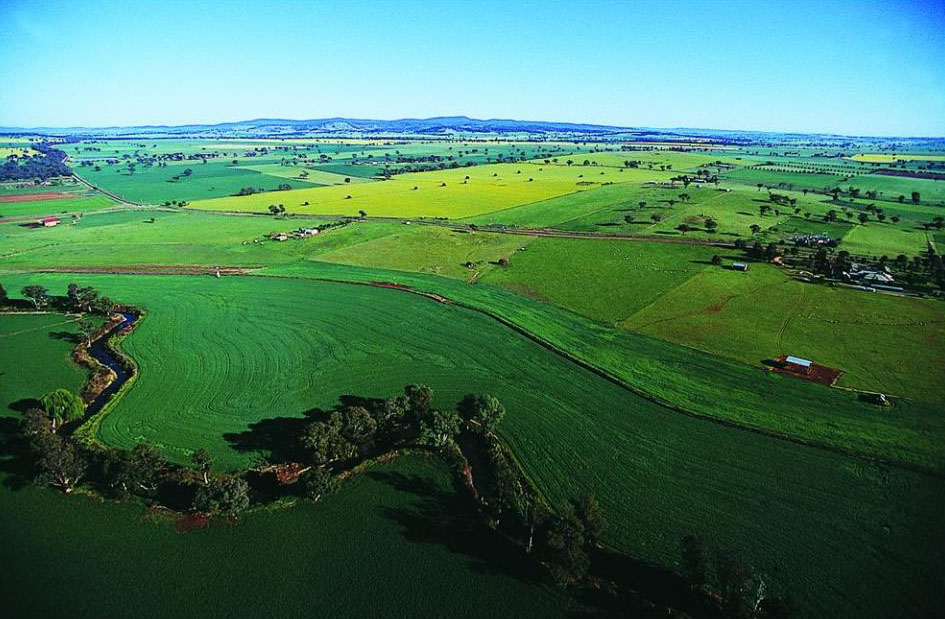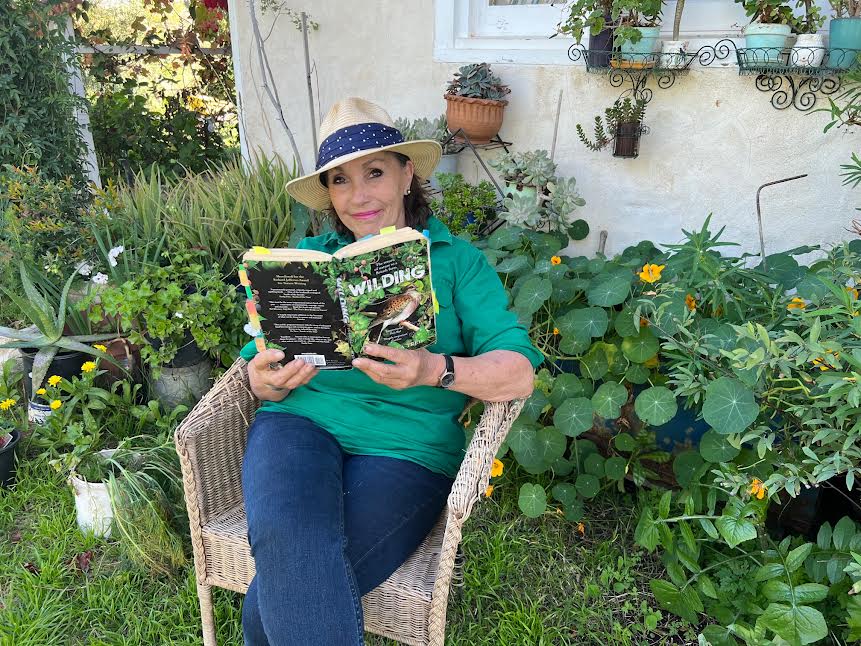Meet Bush Goddess Pennie Scott, Champion of Regenerative Agriculture
I’m running late for my lunch appointment with owner of Bush Goddess Feasts Pennie Scott. She’s suggested we meet at Delice Coffee, a new eatery in Canonwindra which focuses on locally grown ingredients and foods.
It’s a 4 ½ hour drive west from Sydney and I have to negotiate early morning peak hour traffic before hitting the freeway which winds up and over the Blue Mountains.
She’s ordered a platter of locally grown and produced smallgoods and deli items which include Refalo’s Polish salami, pepperoni and cabanosi, slices of their new smoked pork neck, pork loin and prosciutto, accompanied by Rosnay’s Adriatic White Figs and Four Jays Hazelnut Dukkah.
A baby spinach salad with roasted locally grown pumpkin and toasted pine nuts is dressed with Straniero Olive Oil and La Barre Caramelised Balsamic Vinegar.
Located in central west NSW on the Belubula River in Wiradjuri country, Canowindra is well known as the hot air balloon capital of Australia and for its award winning Age of Fishes Museum and curving old worldly main street.
The area is regarded as prime agricultural country due to layers of volcanic soils from ancient eruptions of Mt Canobolas and underground aquifers. Since white settlement, land use has been principally grazing sheep and cattle and some dairy. Market gardens thrived along the fertile river banks.
“The extent of irrigated crops is vast and regarded as innovative farming, using synthetic fertilisers and toxic man-made herbicides, pesticides and fungicides,” Pennie explains.
“But the consequences of these intensive farming regimes is the loss of soil organic matter, leaching of toxins into waterways, annihilation of many species of flora, fauna and fungi and very little ground cover.”
During my visit to the area, she took me to visit a few properties where regenerative agriculture is being practised.
“Regenerative farms restore soil and water quality, lock up carbon, protect the surrounding environment and operate more effective and sustainable cominations of crops, pasture and livestock. They dramatically reduce human pressures on the natural landscape and its resources,” says respected science writer Julian Cribbs in his latest book How To Fix A Broken Planet.
At “Oatleigh”, a grazing property owned by Scotty and Annie Hickman since 1991, the previous management practices of repeated mechanical cultivation and applications of phosphate-based fertilisers continued until a series of extreme weather events wiped out successive crops and cash flow fell away to nil.
Originally there were many species of native perennial grasses including Dianthonia, Warrego, Microlena and Themeda but they quickly diminished and disappeared. Introduced “exotic” species of grasses, cereals and oilseeds replaced the maligned native grasses.
“The wheels fell off in 2005,” Scotty told me. “A hailstorm wiped out out the crop, then we had no rain and were hit by another hailstorm.
“My brother and sister-in law had started holistic farming on a separate property, but back then I didn’t think it was for me.
“The turning point for me was looking at a photo taken in 2005 of my young son sitting on a horse on our farm. The background landscape looked like the moon. That’s when we started to wean ourselves off industrial fertilisers.”
It was around this time he attended the Grazing for Profit course hosted by Resource Consulting Services
and his world flipped 180 degrees.
Setting goals for his land, family and future generations was the beginning of expanding ideas, ecological literacy and on-ground practices such as enabling 100% living ground cover 100% of the time so soil is covered all year-round. Timed rotational grazing to allow plant recovery became de rigeur and Scotty started seeing more grass than ever before.
More than a decade later, the life energies at “Oatleigh” are palpable as cattle quietly graze and rest in paddocks with a wide choice of plants to eat and medicate with. Birds and bees are abundant.
Showing us around his paddocks, Scotty pointed out the arrival of a new native leguminous plant, glycine, a valuable food for cattle. Digging up shovels-full of soil, he pointed to tiny critters living in the soils which hadn’t had any synthetic applications for 13 years. Under and between the roots of some of the taller taproot plants, the soil smelt fertile and fragrant.
“This is what it can be, he explained as he crumbled it between his finger, “and this is what we aim for all over the property.”
“Now there’s total living ground cover, the squestration of atmospheric carbon dioxide (CO2) accumulates and is one of the most effective methods to reduce gigatonnes of CO2 affecting global climate patterns.”
Whilst he recognises a definite change in climate volatility, the effects of sudden and heavy dumps of rain have been minimised.
“We haven’t lost any soil from erosion. In 2022, we had one fall of 175mls in 25 minutes which caused the creek to flood but no other damage. Just about all that rain went deep into the soil which is the best place to store it.”
Locally grown lamb, beef and pork are available at the Canowindra Butchery which re-opened for business in mid-April with new business partners Wal Stranger and Max Benaud (a recipe using the Minoru cutlets and some of the local products is here).
“Adding value to the “Minoru” lamb from Wal’s family property provides transparency and provenance which is something we both learned was so important when we were working in the international trade meat sector,” Max explained. “The story of the origin of what we eat is of great importance and the local support since we opened has been very encouraging.”
Wal’s experience in the international meat trading sector took him to many countries and eventually back to his family property “Minoru”. His parents had moved there almost three decades ago and followed the area’s established practices of intensive mixed farming.
Heavy applications of herbicides and synthetic fertilisers was the usual advice from agronomists to “grow good crops” but no thought was given to how these practices were affecting the soil or any other species endemic to the area.
Wal’s parents, Sam and Anna, questioned these old systems and started thinking differently. In 1998 they established an olive grove and sell their Straniero Extra Virgin Olive Oil while using land regenerating practices.
As we drive through the paddocks, their care for their old trees, soil and animals is obvious. Wal explained the regime for the ewes soon to lamb, to produce sumptuous lamb, and eventually mutton.
“They’re in a sheltered paddock with a variety of grass species including some taller structures of dead senescent stalks which are excellent wind breaks.”
Free-range pig breeder David Refalo is another local farmer whom she respects.
“Ever since he was a boy, David has loved pigs, their personalities, ability to breed and their taste,” she said.
Originally from Kemps Creek in western Sydney, David purchased a small property near Canowindra where he established Refalo Free-Range Pork in 2017. These were challenging drought-affected years, far from ideal for pigs which need an external cooliing system due to not having sweat glands.
“The old saying ‘as happy as a pig in mud’ is not accurate,” says Pennie. “Being cool is important.
“Refalos’ is one of only two accredited outdoor large-scale rotational piggeries in NSW with very strict criteria to meet including animal welfare, reliable water supplies, environmental considerations and prevention of vermin in feed stocks.“
Pennie’s commitment to healthy outcomes for the animals, crops, soils and landscapes of Central Western NSW is to be applauded.
As Treasurer of the Canowindra Business Chamber and Deputy Chair of the Cowra Tourism Corporation, she’s regarded as the go-to person for developing local food economies outside the supermarket system, not just around Canowindra but also in the ACT, the Riverina and south-east NSW.
“There are so many wonderful products grown within 50kms of Canowindra. We have a fabulous monthly market and I’d love to see more food and food growers there,” she told me.
“I love buying from people I know and respect such as Claire Smith and Sarah Galea of Galea’s. And the money stays in our local food economy,” she adds.
To find out more about this farming revolution and the ecological impacts of conventional agriculture on our soils, food and climate, don’t miss Rachel’s Farm, the new film by actor/director Rachel Ward which will be released in cinemas nationally on 27 July 2023.

Platter of local smallgoods at Delice Cafe, Canowindra

Old world main street of Canowindra

The fertile landscape around Canowindra

Scott Hickman with some of the books he consults: “Farmers don’t read enough.”

Scotty Hickman and Pennie Scott at Oatleigh

Scotty Hickman crumbling the regenerated soil in his fingers

Max Benaud and Wal Stranger of Canowindra Butchery holding a platter of “Minoru” lamb cutlets from his family’s property

Pennie with her cows

Straniero Extra Virgin Olive Oil

David Refalo Free Range Pig Farmer

“When a woman moves to a new town, she usually seeks out a hairdresser first”, says Pennie. “I seek out a butcher because I want to know how well they know their craft, the provenance of their meat and what breed it is.”

Claire Smith and Sarah Galea of Galea’s which encourages and supports locally grown fruit, veggies and smallgoods from the Canowindra-Cowra area
